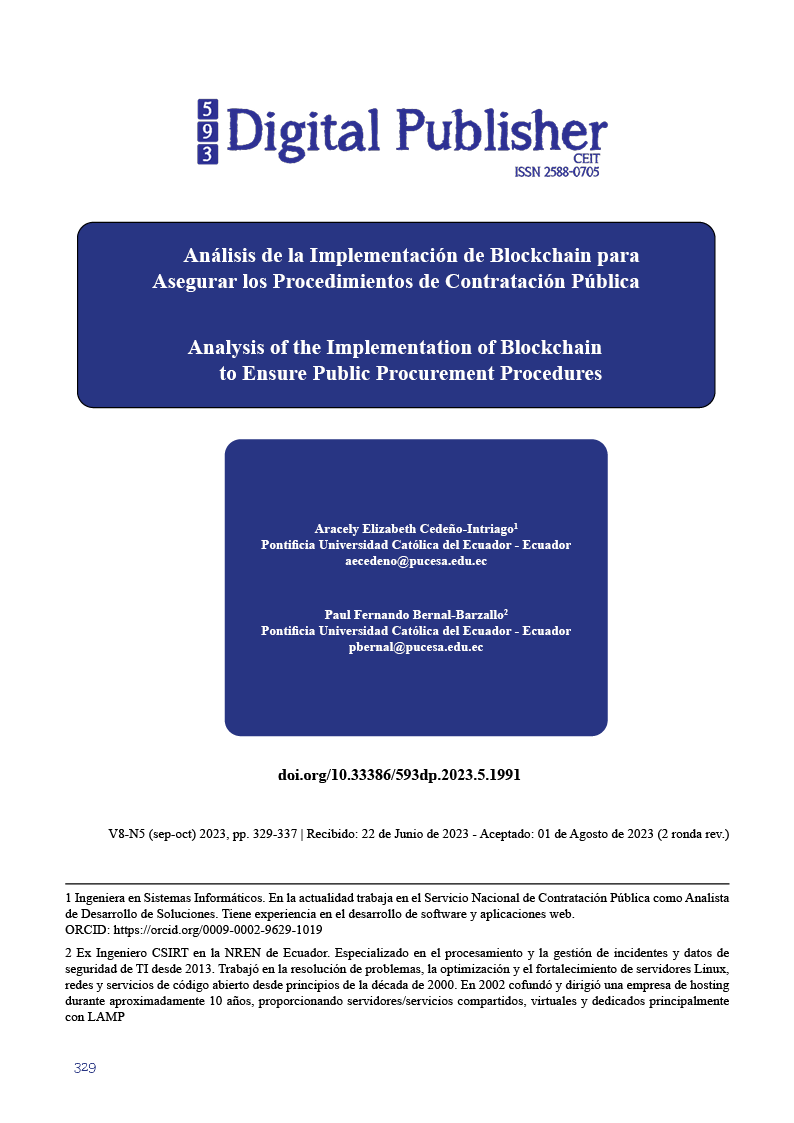Analysis of the Implementation of Blockchain to Ensure Public Procurement Procedures
Main Article Content
Abstract
This research paper addresses the modes and procedures of implementing Blockchain technology to ensure public procurement procedures. Due to the characteristics, advantages and importance in the legal field, the implementation of this digital mechanism faces the challenge of providing public services, in quantity and quality, in an efficient and transparent manner, and often with fewer resources available. Currently, in the National Public Procurement Service (Sercop) there are recruitment processes that have greater number of economic resources allocated, where certain irregularities are usually found, at the stage of awarding suppliers. In this sense, the purpose of this article is to analyze the implementation of Blockchain to ensure public procurement procedures. In this way, the research approach is quantitative; to this end, surveys were carried out with the personnel who work in the Technology Department of the National Public Procurement Service (Sercop). With the implementation of this instrument, it is intended to know the percentage of the current problem of recruitment processes in Ecuador; literature related to the operation of Blockchain technology and its application in global procurement procedures is also reviewed. The aim is to obtain an analysis of the technical, economic, and legal feasibility of the application of Blockchain technology in public procurement procedures in Ecuador.
Downloads
Article Details

This work is licensed under a Creative Commons Attribution-NonCommercial-ShareAlike 4.0 International License.
1. Derechos de autor
Las obras que se publican en 593 Digital Publisher CEIT están sujetas a los siguientes términos:
1.1. 593 Digital Publisher CEIT, conserva los derechos patrimoniales (copyright) de las obras publicadas, favorece y permite la reutilización de las mismas bajo la licencia Licencia Creative Commons 4.0 de Reconocimiento-NoComercial-CompartirIgual 4.0, por lo cual se pueden copiar, usar, difundir, transmitir y exponer públicamente, siempre que:
1.1.a. Se cite la autoría y fuente original de su publicación (revista, editorial, URL).
1.1.b. No se usen para fines comerciales u onerosos.
1.1.c. Se mencione la existencia y especificaciones de esta licencia de uso.
References
Arteaga, J. (2018). Blockchain en procesos de participación ciudadana: innovando desde la práctica en el Ayuntamiento de Alcobendas. Madrid: Centro de Estudios Políticos y Constitucionales.
Barria, S. (2022). Introducción al blockchain. Revista Blockchain e Inteligencia Artificial, 3(4), 1-28. http://dx.doi.org/10.22529/rdm.2022(4)01
Benítez, L. (2020). Blockchain para la transparencia, gestión pública y colaboración. Teknokultura. Revista de Cultura Digital y Movimientos Sociales, 18(1), 23-32. http://dx.doi.org/10.5209/TEKN.71514
Benítez, L. (2021). Blockchain para la transparencia, gestión pública y colaboración. Teknokultura. Revista de Cultura Digital y Movimientos Sociales, 18(1), 23-32. https://doi.org/10.5209/tekn.71514
Brandom, R. (2019). Why the Ethereum Classic hack is a bad omen for the blockchain. The Verge, 2(2), 7-19. https://www.theverge.com/2019/1/9/18174407/ethereum-classic-hack-51-percent-attack-double-spend-crypto
Gómez, J. (2017). Blockchain y los contratos inteligentes. https://joelgomez.abogado.digital/wp-content/uploads/2019/09/Blockchain-y-Contratos-Inteligentes-AbogadoCorporativo.pdf
Grigera, S. (2021). Ciberseguridad y Blockchain. Ciencias jurídicas. Revista Blockchain e Inteligencia Artificial, 2(3), 85-94. revistas.bibdigital.uccor.edu.ar/index.php/rbia/article/view/5254/6502
Ibáñez, J. (2018). Cuestiones jurídicas en torno a la cadena de bloques («blockchain») y a los contratos inteligentes. Revista De La Facultad De Derecho, 2(101), 1-8. DOI: https://doi.org/10.14422/icade.i101.y2017.003
Oszlak, O. (2021). El Estado en la era exponencial. Buenos Aires: CEDES.
Preukschat, A. (2017). Blockchain: la revolución industrial de internet. Barcelona: Gestión 2000.
Quintana, J. (2020). La tecnología blockchain y su pretendida aplicación a la contratación pública como mecanismo para lograr mayor integridad. Revista española de control externo, 22(64), 150-171. https://dialnet.unirioja.es/servlet/articulo?codigo=7776793
Ronquillo, G. (2021). Propuesta de modelo de gestión documental académica inteligente empleando blockchain. (Tesis de maestría). Escuela Politécnica Nacional, Quito, Ecuador. https://bibdigital.epn.edu.ec/bitstream/15000/21602/1/CD%2011087.pdf
Ronquillo, G. (2021). Propuesta de modelo de gestión documental académica inteligente empleando Blockchain. (Tesis de pregrado). Escuela Politécnica Nacional, Quito, Ecuador. https://bibdigital.epn.edu.ec/bitstream/15000/21602/1/CD%2011087.pdf
Sosa, W. (2019). Big data. Buenos Aires: Siglo XXI Editores
Villacís, R. (2019). La legislación ecuatoriana en el uso de Blockchain, Revista Yura, 18(2), 80–97. https://yura.espe.edu.ec/wp-content/uploads/2019/04/18.5-La-legislaci%C3%B3n-ecuatoriana-en-el-uso-de-Blockchain.pdf
Villafuerte, D. (2020). El smart legal contract como nueva forma de contratación en el código de comercio ecuatoriano. (Tesis de pregrado). Pontificia Universidad Católica del Ecuador, Quito, Ecuador.



